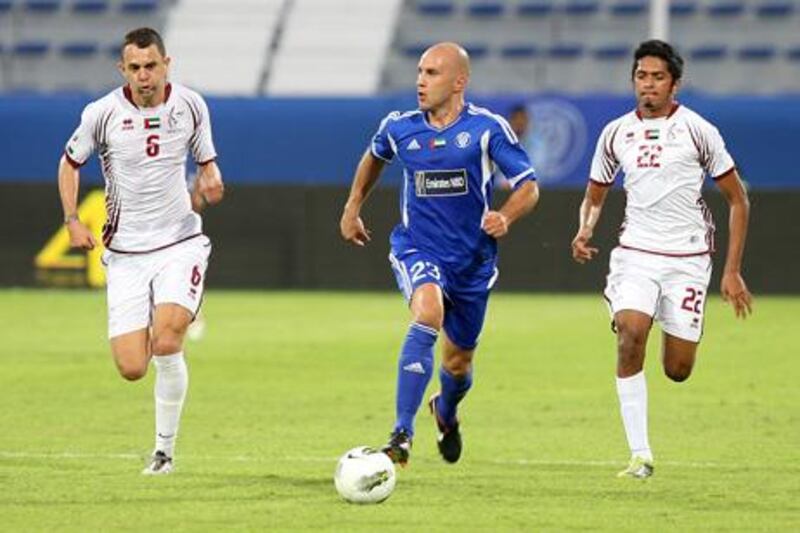Want to know how cleanly Mark Bresciano can strike a ball? Ask anybody who watched Australia make their first big impression on the Asian Cup.
The game was a qualifier for the 2007 tournament and Bahrain were the visitors to Sydney to play the new arrivals to the Asian Football Confederation. The Socceroos had a 1-0 lead and were looking to build on their advantage. First, a sweeping, deep cross, left to right, soars over the Bahrain penalty area.
It is met first time by Mile Sterjowski, but his centre seems too high and the cut back too angled for the advancing Bresciano, a little way inside the penalty area.
All of a sudden, Bresciano turns into a figure from the Matrix movies, airborne and almost parallel to the ground. His scissor-kick makes perfect contact. A nation swoons.
Polls taken in Australia tend to make that goal the finest ever scored by a player wearing the green and gold.
Audiences in Serie A were already familiar enough with Bresciano's trusted right foot, his eye for the spectacular, and now Al Nasr fans in the Pro League are getting acquainted with it after he signed for Walter Zenga's side in the summer as their Asian foreign player.
In a decade in Italy's top-flight, Bresciano was a widely respected, versatile midfielder who contributed useful goals, often from long range, and he became an expert delivering free kicks from beyond 18 yards.
Supporters of Parma and Palermo soon learnt to expect a singular celebration when he did hit the mark.
It became known as the Spartacus pose. Bresciano would stand, dead still after scoring, his arms down by his side, fists clenched, head slightly raised, awaiting the arrival of teammates, evoking an ancient Roman gladiator.
The Italian roots in this Australian evidently run deep. From the surname, we can hazard a guess his father's family would trace their family tree to somewhere in the Brescia region.
Bresciano was born in Melbourne, where for generations there has been a large Italian community. His mother has a Croatian background.
For a young man with sporting talent in a city big on cricket, rugby and Aussie Rules, that heritage was always likely to guide him towards football, a sport preferred and indeed heavily influenced in Australia by the sons, grandsons and great-grandsons of immigrants from southern Europe.
He played club football in his home state of Victoria, and having shone at the elite Australian Institute of Sport and played for his country from Under 17 level upwards, he was wanted by clubs abroad.
Italy was the natural destination and he joined Empoli, along with his compatriot and friend, the midfielder Vince Grella.
He was still a teenager, but established a first-team place and helped Empoli to promotion to Serie A.
Empoli would be relegated quickly, but by then Bresciano was on his way to Parma, where his reputation would grow.
He won his first cap for the Socceroos in 2001, after the Italian Football Federation had been in touch to inquire of the teenaged Bresciano if he might be interested in committing to the Azzurri in the future.
He said "no", and, although Italy knocked out his Australia en route to winning the 2006 World Cup in Germany, he has never voiced any regrets.
Australians identify quickly the Italian in him - commentators often, incorrectly, call him Marco Bresciano - while in Italy, pundits often celebrated what they perceived as his Antipodean dynamism and work ethic, although they always called him Mark, not Marco.
"He's straightforward and direct, a nonconformist and someone who goes out of his way to avoid the trappings of fame," wrote Gazzetta dello Sport, Italy's leading football newspaper, of Bresciano while he was at Palermo.
That was probably his peak period. At Parma, he had been part of a side that reached the Uefa Cup semi-finals, in 2005, but at Palermo he played some of his best football.
"At Parma, we tended to be fighting against relegation and feeling unsure if our wages would be paid on time," he said after moving south.
"At Palermo we challenged up at the top of the table."
Bresciano would, however, experience directly one of the darker aspects of the Italian game in Sicily. He was in the Palermo team the day a policeman was murdered in fighting around a derby against Catania. He would later say that made him think about moving away from Serie A.
He very nearly did so in the summer of 2007, with Manchester City keen to bring him to England.
Bresciano actually trained with City, then managed by Sven Goran Eriksson, but the move broke down when Maurizio Zamparini, Palermo's notoriously skittish president, changed his mind, citing problems with City's payment plans. Bresciano would spend another three seasons - and, this being Zamparini's Palermo - under five different head coaches at the club before a single, low-profile campaign at Lazio.
Instead his link to Italy has continued, with him now working under Zenga, the Italian coach, at Nasr.
Under some coaches, he thrived, under others he perhaps suffered for his versatility, used in many different positions across and just ahead of midfield.
He seldom complained. Guus Hiddink, the head coach of Australia ahead of and at the 2006 World Cup once told reporters he found Bresciano "hard to work out", observing he lacked the brashness of some of his international colleagues.
It was not a criticism, just a way of observing that this Spartacus is no prima donna.






